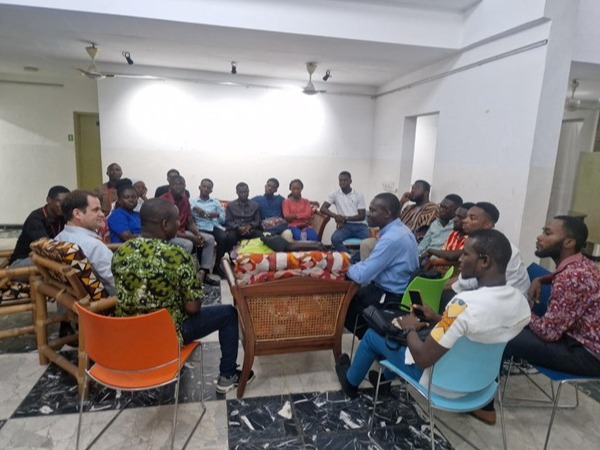Innovative skills partnerships are laying a solid foundation for legal migration and workforce development between Ghana, Senegal, and Germany.
Despite a clear demand for medium-skilled and vocational workers in Europe, legal channels for migration from Ghana and Senegal remain limited. One of the new projects funded through the MPF aims to change that brick by brick.
The Skills Partnerships Senegal/Ghana and Germany is led by the Deutsche Gesellschaft für Internationale Zusammenarbeit (GIZ), the German Agency for International Cooperation, is building the foundations for a triple-win approach to take root between these countries in the construction sector, one of the main employers of foreign labour in Germany and a driver of economic activity in Ghana and Senegal.
A Triple Win: Migrants, countries of origin and countries of destination in alignment
At the heart of these efforts is the concept of a Global Skills Partnership (GSP), an idea championed by economist Michael Clemens and endorsed in global migration frameworks such as the Global Compact for Migration and the EU’s Talent Partnerships. The premise is simple but profound: provide relevant, high-quality training both, in the countries of origin, but also in the country of destination, aligning with labour market needs. The result? A triple win—for migrants who gain employable skills, for origin countries that benefit from stronger vocational systems, and for destination countries that address labour shortages.
In Ghana and Senegal, investments are being channelled into Technical and Vocational Education and Training (TVET) systems, ensuring that local training reflects both national and international standards. This not only opens legal pathways for migration but also strengthens local economies by addressing domestic skills gaps.
Models of mobility: different routes, one foundation
Under the current MPF project, three mobility models are being developed, reflecting different ways in which migrant workers might access the German construction labour market.
Model 1: Training in Germany with local preparation
Participants begin with a language course in Ghana or Senegal, followed by vocational training in Germany. Recent assessments show encouraging preliminary results: in March 2025, 22 out of 24 participants in Senegal passed the A2 German language level, while in Ghana, 19 out of 20 passed A2. These numbers highlight the commitment and capability of the participants and signal the programme’s potential for scalability. Meanwhile, German stakeholders are actively engaged, with information sessions having taken place with the National Building Association, representing over 4,500 construction companies in North Rhine-Westphalia alone.
Model 2: Two-track training across borders
In Senegal, a new training programme in “road construction” is being developed following a planning session with local stakeholders. To help shape the programme, an expert from the renowned International Master Craftsman School in Germany is supporting the team. The goal is to create a course that not only meets local needs but also aligns with German training standards—making it easier for young people in Senegal to continue their training or find work in Germany.
Meanwhile in Ghana, a blended training model is being tested, combining local training tailored to both Ghanaian and German standards. Surveys with employers and comparisons of existing curricula have already been carried out, helping to identify key skill gaps. These insights are now guiding the development of updated training modules.
Model 3: Pre-departure training for direct employment in Germany
This approach is based on recent updates to Germany’s Skilled Workers Immigration Act. Candidates will be tested and trained, if required, in their home countries before migrating for employment. The training will be short-term but targeted, shaped entirely by the results of skills gap analyses. This model allows for flexibility and responsiveness to real-time labour market demands.
Strengthening the pillars: networks and sustainability
A key factor in the long-term success of these efforts is the strong network of partnerships being built across different sectors. German organisations—such as the Employers’ Federation and diaspora associations—are playing an active role, helping to shape training programmes and explore ways to support systems like pensions.
Since many trainees following the “work abroad” path may eventually return to Ghana or Senegal—whether after their training or a longer period of work—the project also strengthens the idea of circular migration, a core goal of skills partnerships.
From plans to practice: what is next?
While mobility under the Skills Partnerships project implemented by GIZ is soon to begin, the first departures are planned for end of July 2025, the foundational work is well under way. As pilot training efforts in Ghana and Senegal progress, the next steps will involve scaling successful models, refining curricula based on evolving needs, and continuously engaging with employer networks in both regions.
Praising the project, Heinz G. Rittmann, Deputy Chief Executive Officer of the Construction Associations of North Rhine-Westphalia said, "With GIZ, we have found a partner who is well connected locally. This enables us to develop a sustainable solution to the shortage of trainees and skilled workers—one that is long-lasting and associated with fair costs for all parties involved, both for the companies and for the applicants."
Much like in construction, success will depend on strong foundations and, quality materials—in this case, skills and training—and a collaborative workforce. These partnerships are not just enabling migration; they are co-creating durable pathways for people to build better futures, at home and abroad.
MPF and Legal Migration and Mobility Projects
The Skills Partnerships Senegal/Ghana and Germany is just one of the many projects that MPF supports through its grant-making component. Currently, there are 14 active projects under the thematic portfolio Legal Migration and Mobility that share many common features.
These projects combine mobility activities with in-depth analysis of labour market needs in EU MS and countries of origin, with capacity-building and stakeholder involvement, and with support for participants upon return to their countries of origin or integration in the destination country.
The mobility component of these projects offers concrete possibilities to migrate permanently or temporarily to Europe for work and/or training and is increasingly accompanied by activities that seek to align education and training standards to pave the way for potential future labour migration with greater mutual benefits.
These initiatives aim to create sustainable and reliable cooperation structures and operate on multiple levels, including national and subnational actors who lead efforts to attract international talent and promote skills and mobility partnerships.
They cater to the private sector by responding to the real needs of businesses in both countries of origin and destination, while at the same time providing benefits to migrant workers through remittances and intercultural and on-the-job mentoring for the beneficiaries involved.
Further reading
You can access the full portfolio of legal and labour mobility projects funded by the EU in our Projects page or read more details about this project in the Info Note.

